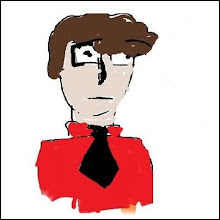This re-launch eventually led to Bendis, Mack and Brubaker all writing the Man Without Fear, which are all very good things. The issues by Smith that got the ball rolling, not so much.
The art is done by Marvel editor in chief Joe Queseda, and is cartoony to say the least. This contrasts sharply with the tone Smith tries to set; one of pathos. So right off the bat the dissonance is rather jarring. I'm not saying Queseda is a bad artist, just that from page 1 forward his cartoony art style clashes with the attempted seriousness of the text. Guardian Devil has more problems with the tone coming it's way unfortunately. Smith can't help but be cute with his first comic book job, and thus we have Daredevil holding a loaded gun to his head contemplating suicide in the same story that includes references to Smith's own films, other film jokes and various instances of self-aware comic book dialog. To further flush things, the script is just waaaaaay too wordy.
Returning to the inconsistent tone, some examples include Bullseye holding a copy of Catcher in the Rye with quotes from Jay and Silent Bob on the back cover. Is Smith so ego-centric that when writing a serious story he has to include references to himself? Apparently the answer is yes. In the final speech by the surprise mystery villian, Mysterio for some reason, he refers to the most recent Spider-man as not being the real spider-man (Spiderman was going through a continuity shakeup at the time) and says him and Daredevil are second stringers (apparently Mysterio has access to Marvel's sales figures). This doesn't work in a serious story and keeps bringing attention to "Hey! Kevin Smith is the writer!", which is presumably the intent.
The plot of Guardian Devil seems to be simply be: Spiderman villain Mysterio copies what the Kingpin did in Born Again. Smith, of course, brings attention to this by including characters and concepts from Born Again (i.e. Sister Maggie and Matt losing his mind). It's as if he wants us to know he is aping Frank Miller. And why Mysterio? Why should I, the reader, a Daredevil fan, care one iota about a Spiderman villian? It's a horrible concept from the word go. Mysterio then kills himself while referencing Kraven's suicide, another instance Smith copies another more famous storyline and then tells us he's copying it, as if to try and excuse himself.
The difference between Born Again and Guardian Devil is stark and wide, owing to the vast differences between the respective writers' ability. Both involve master plans to destroy Daredevil. In Born Again, the mastermind is the Kingpin, his arch-nemesis, frequent rival and all around epitome of human evil. In Guardian Devil, the villain is Mysterio, a Spiderman villain with an almost non-existent connection to Daredevil. In Born Again, the bad things happen to Murdock. In Guardian Devil, the bad things all seem to pile on Daredevil's supporting cast, a cheap writer's trick to get a shock to the audience. Of particular note is Karen Page, who receives both an AIDS diagnosis (oddly, the thought that she may have infected DD doesn't occur to her until someone else mentions it) and is subsequently murdered/stuffed into a refrigerator. Smith ably maintains DD's abysmal record of women supporting characters being picked apart by writers to get a rise out of him. In Born Again, DD is driven mad by the culmination of so many bad things happening to him. In Guardian Devil, he gets slipped a drug secretly, which Dr. Strange cures him of in a quick cameo.
About the only positive thing I can recommend about Guardian Devil is the fact it delves into Murdock's religious views as a lapsed Catholic, something that is done too rarely. This aspect still has issues, however. For example at the end, Daredevil says "To do my Father's work." as he swings into action. God's work is to beat up street thugs? This strikes me as enormously intellectually shallow. More interesting would be the admission that devoting your entire life to violence is decidedly un-Christian, for example.
Frank Miller is a good enough writer that he successfully pulled off a combination of humor and pathos in his original DD run. In attempting to walk in the steps of giants, Smith stumbles grievously.
